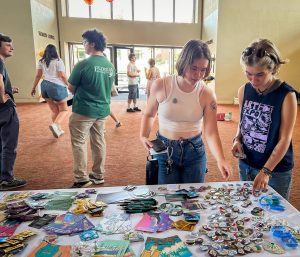Financial sustainability report evokes uncertainty in the department of theatre and dance
March 11, 2021
After the first proposed draft garnered significant attention and protest, Whitman College President Kathleen Murray released the final financial sustainability report (FSR) on Wednesday, March 3rd. The budget plan includes reductions in many sectors, including the theatre and dance department, which has been hit hard because of its low major enrollment.
One of the actions recommended in the financial sustainability report is the reduction of Senior Lecturer of Dance Peter de Grasse’s position from full-time to part-time. Although the exact extent of this reduction has yet to be established, the report suggests anywhere between a .2 or .4 reduction in hours, a difference between a full time equivalent and a part time position.
De Grasse is concerned about the long reaching impacts of these cuts, both for himself and his successors. He worries that he might need to leave his position behind depending on the size of the reduction. If this happens, the low draw of a part time position in an area with few other opportunities for dancers might make it difficult to find a suitable replacement.
“Hiring risks could become finding who is available, and not who is best qualified… There could be a year to year challenge of finding someone to teach these courses, which has an impact on students with respect to continuity of the instruction,” de Grasse said.
Additionally, de Grasse is concerned with how the cuts that have been suggested by the FSR might end up affecting the work that he and other non-tenure track faculty have been engaged with in the larger Walla Walla community. De Grasse has devoted a lot of time to outreach projects, including contacting and working with the the Confederated Tribes of the Umatilla Indian Reservation.
“I’m hoping to do work that is sustainable as ongoing programs, particularly the student access and enrichment component, that can go on with or without me. But because I’m the one building it, if I’m not here it doesn’t get built. That’s above and beyond what is happening with the dance curriculum, per se, but it matters to Whitman and it matters to this community,” de Grasse said.
Junior theatre major Alyx Kruger also echoed de Grasse’s sentiment, and is worried about what could be lost that might not be as visible as changes to the curriculum.
“It’s a little disheartening and unfortunate… Peter has led really substantive outreach efforts with the greater community to bring street styles and hip hop to Whitman, and to collaborate with one of the local high schools.”
Kruger is also concerned that one of the Whitman theatre program’s biggest draws has ended up hurting the department.
“Non-theatre majors can be really active in the theatre department, and often are… It’s a little unfortunate that these cuts are being made based not on class size or class attendance, but are based on major involvement,” Kruger said.
Kruger has been thinking about the FSR process, what it represents to her, and what she hopes will come out of it.
“I think that this is an opportunity for people to think creatively about how to save the things that we love, instead of just thinking ‘well be got to make cuts somewhere, that’s just how it has to be’,” Kruger said.
Another student, senior theatre major Eva Sullivan, responded to Kruger’ comment. She addressed the unique circumstances brought about by the pandemic, and the ways that people have overcome obstacles. “This whole year has been about that: adaptability and creating opportunities,” Sullivan said.
With so many questions still remaining, and so much still up in the air, many community members are still hesitant to make any claims about how the FSR will end up impacting the theatre and dance department, and all departments affected by cuts. Until the cuts are finalized, uncertainty remains among members of the theatre and dance community.






